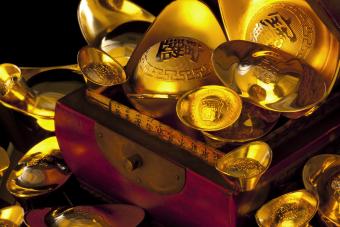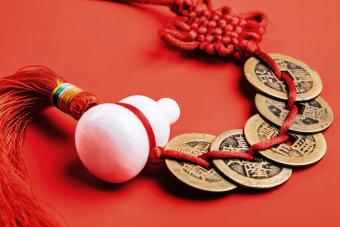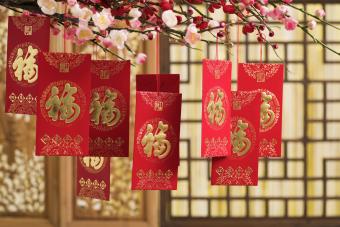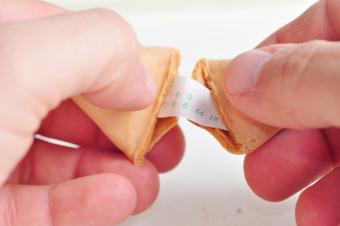
Chinese symbols have a ton of uses in feng shui. And even in Western feng shui, they are often used as remedies to help balance negative energy or create a certain vibe. You can try putting some of these symbols to use in your spaces to create positive energy or to serve as good luck charms. You can use the feng shui bagua map below to determine where to place some of these symbols for the best luck.

Related: 10 Feng Shui Prosperity Symbols That Invite Abundance
Gold Ingot

These golden icons resemble a funny-shaped hat. Many people place these symbols in wealth areas of their homes to bring them good luck and to improve finances.
Coins Tied With Red Ribbon

You will find Chinese coins tied together in either three or six combinations. Verify that the coins used come from a positive dynasty. You don't want to invite negative energy by using coins from a tyrannical, cruel dynasty. Place coins in your wealth sector to stimulate the energy to draw more money your way.
Fu or Foo Dogs

Fu dogs are stylized lions originally created to instill fear in would-be thieves. Crafters carved these very large guard dogs from stone to be placed in front of the imperial palaces. These fictional creatures quickly became the symbol of great wealth and protectors of riches.
Dragon Turtle

If you want to attract great wealth and success, just add a dragon turtle to your wealth or career sector. This mythological creature has a turtle body with a dragon-style head. The energies associated with this symbol are courage, determination, power, and success. This is a powerful symbol for business endeavors. The depiction of the dragon turtle is on top of a heap of gold ingot and I-Ching (a positive dynasty) coins. Its mouth is open so it can blow out positive energy with great power. Typically, you'll find a coin in its mouth. Make sure the coin is face up (side with Chinese characters).
Three-Legged Toad

A three-legged toad is a very powerful symbol for calling wealth into your home. Most statues come with a Chinese coin in the toad's mouth, similar to the dragon turtle statues.
Goldfish

Goldfish will attract money and wealth to you. For best results, use a combination of eight red and one black or eight black and one red fish.
Ox

Many believe that sacred animals and deities will grant your heart's desires. These people revere the ox as a sacred animal. You can use symbols of the ox as good luck charms in whatever sector of your home that you want to activate. For example, if you have a wish for a certain job, place this symbol in the career sector of your home or home office.
Lucky Bamboo

Lucky bamboo attracts fresh new energy to help you re-energize certain sectors of your home and, subsequently, your life. These arrangements come with varying numbers of stalks. Each number has a specific meaning and symbol of what kind of luck it can bring to you. Place them in sectors of your home that are governed by the wood element or the fire element.
Mystic Knot

The mystic knot is a knot of eternity (figure eight) and contains six other infinity knots. This series of tied knots creates a charm of endless luck and great abundance to whoever wears or uses it in a home décor. The knot is typically made of red silk cord and often is attached to another charm for a specific purpose, such as coins for attracting wealth or a pair of Mandarin ducks used as a symbol of a happy marriage.
Red Envelope

People use red envelopes to bestow blessings on the receiver. There are many occasions when you can gift someone with a red envelope, such as a wedding, birthday, anniversary, or job promotion. The myth behind this symbol originated from a young man slaying a dragon. Out of gratitude, the village collected coins and sealed them inside a red envelope and then gave it to the dragon slayer. Make sure there is always one Chinese coin inside the envelope before you seal it and give it away.
Mandarin Ducks and Cranes

The Mandarin duck and the crane are two of the most commonly used symbols for a long and happy marriage. Whichever one you decide to use in the marriage sector of your home, be sure to use two ducks or two cranes to represent you and your partner.
Peonies and Peach Blossoms

Two of the most popular choices of flower symbols for love are peonies and peach blossoms. Their delicate beauty is full of elegance, longevity, and abundance.
Rose Quartz

Rose quartz is considered the epitome of a love charm. Wear it as a necklace, either natural or carved into a love symbol.
Lovebirds

In the Chinese culture, birds, often exotic, represent love. The two most prominent ones are a pair of Mandarin ducks or a pair of cranes. In many of the drawings, these birds are stylized and have elegant flowing lines of feathers to convey the emotion of love. Use these in pairs if using ceramics or pictures.
Goddess of Love

A figurine of the love goddess, Kwan Yin, is often used in homes to symbolize all of the qualities this goddess embodies, which include compassion and mercy, necessary for love to exist in harmony.
Phoenix and Dragon

The legendary phoenix rising from ashes to create a new life is the yin of the yang found in the dragon symbol. When you use the two together, you draw the energies of yin and yang in an effort to create the perfect balance, which in turn will bring great happiness.
Magpie

Many of the good luck symbols don't have a legend or mythological story behind their designation. The magpie is such a symbol. It's distinction as a symbol for happiness is simply because the pronunciation of the word, magpie, in Chinese is similar to the pronunciation of the word happiness. There are various superstitions that have grown out of this symbol for happiness. For example, if a magpie caws outside your home, then it's a sign or omen that someone will soon arrive with good news that will make you very happy.
Fuk Luk Sau

The Three Lucky Immortals are said to bring great happiness and good health. The figurines are often placed in the dining room to attract wealth, prosperity, and good health to the family.
Laughing Buddha

Happiness is bestowed upon your home, along with abundant spiritual insight and material wealth, when you place a statue of the Laughing Buddha in your most auspicious sector. Be sure to give Buddha an elevated location and place of honor.
Lotus

As the symbol of beauty and enlightenment, the lotus flower attracts auspicious energies guaranteed to make your life one filled with great happiness.
Numbers

Certain numbers are considered good luck and believed to draw in happiness and abundance. These include the numbers six, eight, and nine.
Selecting the Right Chinese Symbol
As you can see, there are many Chinese symbols, meanings, and elements to consider when selecting one for your home. Consider each one and then decide which one(s) you want to use.







